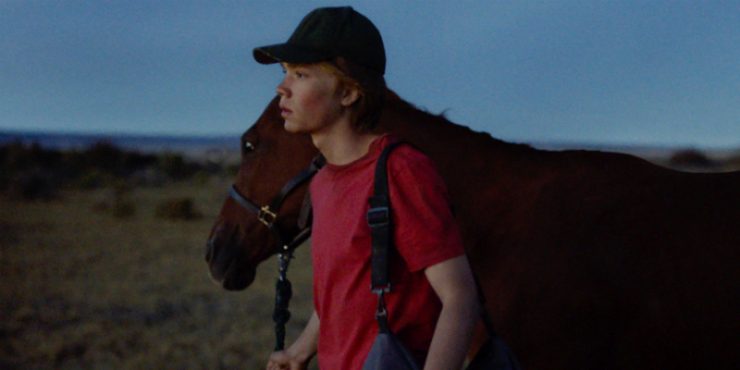Lean on Pete is English film director Andrew Haigh’s dive into the iconography of Americana. It’s story (the script is by Haigh, and based on a novel by Willy Vlautin) allows him to set up canvas-like shots of the Sprawling American West and creates an intimacy with a certain sect of the white lower class that has been getting an especially heavy dose of sociopolitical attention these past few years. The movie is about an ambiguously-aged teenager named Charley (Charlie Plummer) who lives in Oregon with his affectionate but irresponsible father, Ray (Travis Fimmel). Charley is a well-behaved young man but his life is incredibly lonely. His father is a compulsive womanizer who’s often not home, and Charley’s mother has been out of the picture when he was small. When he meets an ornery horse rancher named Del (Steve Buscemi), he’s introduced to the world of horse racing, and one horse in particular.
After helping Del with a flat tire, Charley convinces him to hire him as general help: cleaning the horse stalls, moving the truck, basically all the dirty work that Del had tired of doing decades ago. Charley also meets Bonnie (Chloe Sevigny), a talented veteran jockey who races Del’s horses from time to time. Del tilts between tough-but-fair and flatly irascible, but Bonnie is easier to be around. She’s friendlier to Charley and gives him some tips on working for Del; the most important one: don’t fall for the horses. But this is exactly what Charley does when he meets Lean on Pete, a five-year-old quarter horse who is too slow for Del’s standard and is only worth as much as he’s going to get when he sells him. Both Bonnie and Del express bluntly Lean on Pete’s oncoming fate, but Charley becomes completely enraptured with his new friend. When Ray falls ill, and Del’s prospects on Lean on Pete become dire, Charley decides to steal Lean on Pete and walk him into the deserts in search of a new home.
On the one hand, Haigh has made a film about the unmerciful force of grief and shocking speed in which general poverty can give way to full blown homelessness. In a time of pain and anguish, Charley turns to a voiceless horse to express his fears and hopes. He wanders with Lean on Pete, hoping to find his way to an aunt that lives in Wyoming, the closest thing he has to responsible family at this point. Charley and Lean on Pete meet a number of characters, including combat veterans and homeless riffraff. Traveling with a financially useless racehorse, Charley’s naiveté prevents him from realizing the truly quixotic nature of his path. And perhaps it is Haigh’s English background that prevents him from realizing that he has also made a movie about white privilege. This is a young man who’s desperation leads him to a multitude of illegalities – some worse than others – that he never has to answer for. It’s not surprising that Charley walks away free, but the movie’s silence on the matter seems a bit disingenuous.
Lean on Pete is an incredibly handsome film. Haigh uses his setting to its highest potential. Charley and Pete’s situation in the desert never seems too dire because Haigh views their travels as a form of freedom and, at best, paradise. As Charley, the young actor Charlie Plummer is absolutely fantastic, so perfectly displaying the compressed, muted emotions banging around inside Charlie’s mind. Plummer’s soft-spoken approach to the material seems note-perfect for the story, a tale that never seems to feel like raising the stakes. Charley’s coming-of-age is Lean on Pete‘s most interesting aspect, though the film gives a conclusion to his story that doesn’t exactly feel consistent with what we had seen previous to it. Haigh’s preoccupation is obviously with Charley and the healing nature of his relationship with Lean on Pete, which is what succeeds, but he’s also made a choppy, two hour film with little regard for the story outside of that.
Haigh’s previous two features, Weekend and 45 Years, are two of the best dramas of this decade. Both movies involve characters searching for their identities and relationships searching for meaning after an event that is small in scale but cataclysmic emotionally. Lean on Pete seems like a purposeful move away from that level of high-octane drama, starting with Plummer’s lo-fi performance. There’s a lot in this film that works; mostly, it’s the performances but also Haigh’s beautiful way of dealing with repressed anguish and stinging loneliness, but I fear Lean on Pete works better as a piece within Haigh’s oeuvre than as a film on its own. Haigh still shows not only a competence but a flourish in dealing with the complexities of the human condition, and gets his cast to bring the goods when they’re called upon (Buscemi, Sevigny and Fimmel all do great supporting work, as does Steve Zahn in a handful of later scenes), but Lean on Pete has a feeling of incompleteness that’s hard for me to express, but even harder to deny.
Written for the Screen and Directed by Andrew Haigh










